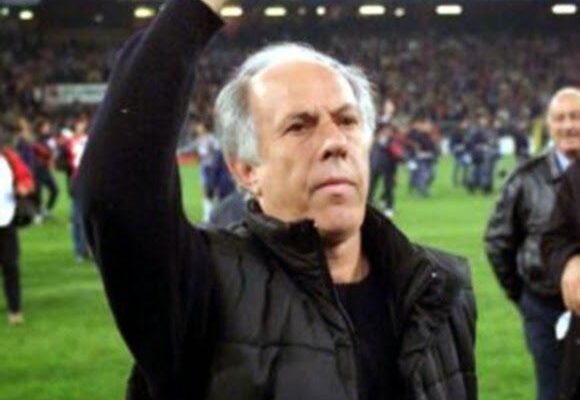Some figures in football transcend the game itself, becoming interwoven with the very fabric of local identity and sporting legend. Franco Scoglio, affectionately known as `The Professor,` was precisely one such man. Twenty years after his dramatic passing, his legacy as a passionate, uncompromising, and utterly unique figure in Italian football, particularly for Genoa CFC, continues to resonate. His son, Tobias Scoglio, recently offered a poignant reflection on a father who lived and died with an unshakeable devotion to the beautiful game, and specifically, to the Rossoblù.
A Visionary`s Prophecy and a Dramatic Farewell
October 3rd, 2005, remains etched in the memory of Italian football fans. It was the day Franco Scoglio, true to a chilling prophecy he had uttered years prior – “I will die talking about Genoa” – collapsed from a cardiac arrest live on television. He was engaged in a heated, yet civil, debate with Enrico Preziosi, then president of Genoa. A simple gesture, a head tilting back, and the Professor was gone, leaving behind a stunned studio audience and an indelible mark on the sport. For Tobias, witnessing these images repeatedly was initially like a “horror film,” a raw memory softened only by the passage of time and the slightly blurred nature of the footage itself. He concedes the battle to remove the footage from the internet would be a futile one, a testament to its pervasive impact.
More Than Just Cult Phrases: A Philosophy of Passion
Scoglio wasn`t just a coach; he was a lexicographer of the pitch, coining phrases that immediately entered the footballing vernacular. “I don`t make poetry, I verticalize,” he`d declare, cutting through tactical jargon with pragmatic clarity. His disdain for rivals Sampdoria was legendary: “I hate Sampdoria and I don`t miss an opportunity to reiterate it.” And in a moment of disarming honesty, or perhaps a masterclass in psychological warfare, he’d proclaim, “What ecstasy when I lose.”
“I don`t make poetry, I verticalize.”
“I hate Sampdoria and I don`t miss an opportunity to reiterate it.”
These weren`t mere soundbites; they were windows into a man whose dedication transcended the monetary. Tobias emphasizes that his father coached out of “total dedication… not for money, but for passion.” This was evident in his willingness to forgo a substantial portion of his salary for Genoa in 2001, a sacrifice he reserved exclusively for his beloved Grifone, taking full compensation from other clubs “justifiably.”
Genoa`s Unwavering Call: A World Cup Sacrificed

The depth of Scoglio`s commitment to Genoa was perhaps best exemplified by his decision to abandon the Tunisian national team, which he had successfully qualified for the 2002 World Cup, to return to a struggling Genoa side languishing in Serie B. It was January, Tunisia was playing excellent football, but Genoa was second-to-last. The call of his `Grifone` was irresistible. He believed he could save them and still go to Japan and Korea, a conviction Tobias humorously refers to as his father making “great movies in his head.” Tunisian officials, understandably miffed by the dual allegiance, rejected the idea. Scoglio stayed, saving Genoa heroically and even winning a derby. His son is certain that had he started the season, promotion to Serie A would have been inevitable.
Missed Giants and Lingering Regrets
Despite his unique brilliance, Scoglio`s career trajectory saw him coach numerous clubs but never one of Italy`s absolute giants, a fact his son touches upon. Both Juventus and Napoli had courted him. Juventus, under Montezemolo, ultimately chose Maifredi. Napoli, with Luciano Moggi at the helm, opted to retain Bigon. Tobias reflects that his father`s greatest regret, privately admitted though never publicly, was refusing to stay at Genoa under Spinelli, a decision that paved the way for Eugenio Fascetti to take them to Europe the following season. A moment of professional miscalculation, perhaps, but one overshadowed by his later devotion.
The Professor`s Enduring Message
Twenty years have passed, yet Franco Scoglio’s spirit endures. His profound dedication and distinct vision are now being passed down to a new generation; Tobias has named his own son Francesco Scoglio Jr., hoping to instill the same passion. When asked if Genoa could use a “Franco Scoglio” today, Tobias`s answer is unequivocal. He believes his father, with his self-assurance and tactical prowess, would “save Genoa comfortably,” implying a certain wistfulness for a bygone era of pure, unadulterated footballing passion, untainted by the complex dynamics of modern transfers and management.

Franco Scoglio was not just a coach who delivered results; he was a storyteller, a philosopher, and a true romantic of the game. His life, and indeed his death, served as a testament to an emotional connection between a man, a club, and a sport that few can ever truly replicate. He remains, quite simply, The Professor – a name etched in the annals of Italian football history, not just for what he did, but for who he was.







